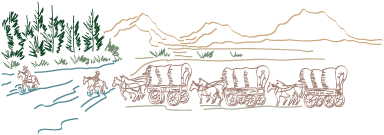Heritage Gateways
Official Sesquicentennial K-12 Education Projectsponsored by the Utah State Board of Education, the BYU-Public School Partnership and the Utah Education Network
Pioneer 1847 Companies
1847: Friday, April 23 - He found a way to recoup his final paycheck

Description: Graphic by Steve Milam.
Image courtesy of: Heritage Gateway Project Images, these images
have been gathered to support the Sesquicentennial celebration of
the immigration to Utah.
Date: April 23, 1847
Although Brigham Young told the Mormon pioneers not to take "one cent" worth of tools, iron or equipment from the abandoned missionary station where they spent the night, a way around this ban was found.
James Case, who once worked as a $300-a-year government farmer near the station, said he was fired from his job and denied his last payday when the 12rmy commander learned he had joined the Mormons.
Under the circumstances, Brigham said Case was entitled to some of the abandoned material at the station in lieu of his pay. Other pioneers could share in it by hauling the goods for Case on a 50-50 basis.
However, the president instructed Case to write former officials of the station and explain what he had done. The Mormons promptly helped themselves to some of the stoves, plows and iron bars lying about.
Brigham, always busy as a scout in addition to his leadership responsibilities, led a party of 12 men to look for a good crossing of the Loup Fork. The rest of the men repaired their wagons and graded a road to Plum Creek, which also would have to be crossed.
The scouts returned to say they couldn't find a good place to ford the Loup, but there was a possible place about four miles away if the company wanted to chance it.
Teams were hitched up and the wagons made it over Plum Creek and another stream called Cedar Creek, although they had some difficulty in the latter crossing. They finally reached the fording place on the banks of the Loup.
William Clayton said that by the time he arrived "my feet were so hot and blistered I could not walk for some time." He had been having trouble with sore feet for several days.
The pioneers were disappointed at the crossing site because of sandbars, quicksand and a rapid current reaching waist high in places. The river was 400 yards wide and split into two streams by a large sandbar in the middle.
Luke Johnson tried crossing first after completely unloading his wagon. Even then he had great difficulty.
Orson Pratt went next with a partial load, but his horses couldn't pull against the quicksand. A number of men jumped into the river, lifted the wagon wheels and pushed until they reached the sandbar at mid stream.
Norton Jacob started over and had the same trouble. His slow-moving oxen sank in the sand and he had to leap from the wagon into the water. Ten men rushed to his rescue and used a rope to pull the wagon to the sandbar.
Pratt ventured into the second half of the river, but the quicksand mired his horses so badly that one of them fell down. Two men helped him unhitch the team and lead the animals to safety. The wagon was unloaded and the goods carried across. Then the wagon was pulled over by rope.
Two or three other wagons got over the river by the same method of unloading and being pulled by rope. Brigham finally ordered a halt because of the strenuous problems. The pioneers decided to build two rafts the next day.
Tarlton Lewis was placed in charge of building one raft and Thomas Woolsey the other.
Lewis, 41, was a southerner and a skilled carpenter. He was a bishop in Nauvoo and his 17-year-old son was serving with the Mormon Battalion. He later became a bishop in Parowan and helped settle much of southern Utah, discovering iron ore deposits and starting some of the first mines in the area.
Woolsey, 41, also a southerner, had enlisted in the Mormon Battalion and marched as far as what is now Pueblo, Cole., before being sent back as a messenger He and others were captured by Indians on the journey and sentenced to death, but other Indians helped them escape. He arrived in Winter Quarters only three weeks before the pioneer trek west began.
The aborted crossing of the Loup Fork left six men on the far bank for the night. They were nervous because of hundreds of Indians known to be in the area and stood guard three at a time. Five men crossed by boat in the night to bolster their numbers.
"I stood guard in my wet clothes half the night," Jacob said, "and slept in them the other half."
Source: 111 Days to Zion © Copyright 1997 Big Moon Traders and Hal Knight. All rights reserved. No part of this book may be reproduced or utilized in any form or by any means, electronic or mechanical, including photocopying, recording or by any information storage and retrieval system, without permission in writing from the publisher. This includes educational uses.